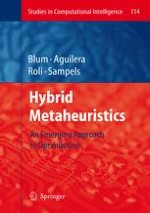Optimization problems are of great importance in many fields. They can be tackled, for example, by approximate algorithms such as metaheuristics. Examples of metaheuristics are simulated annealing, tabu search, evolutionary computation, iterated local search, variable neighborhood search, and ant colony optimization. In recent years it has become evident that a skilled combination of a metaheuristic with other optimization techniques, a so called hybrid metaheuristic, can provide a more efficient behavior and a higher flexibility. This is because hybrid metaheuristics combine their advantages with the complementary strengths of, for example, more classical optimization techniques such as branch and bound or dynamic programming.
The authors involved in this book are among the top researchers in their domain. The book is intended both to provide an overview of hybrid metaheuristics to novices of the field, and to provide researchers from the field with a collection of some of the most interesting recent developments.
